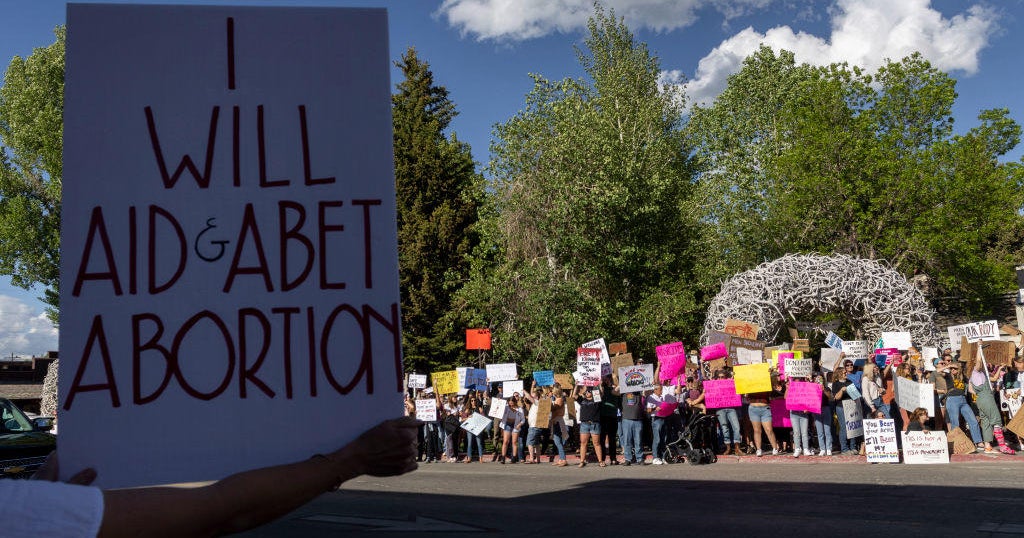Appeals court upholds order requiring revival of "Remain in Mexico" border policy
A federal appeals court on Monday night upheld a lower court order that required the U.S. to reinstate the so-called "Remain in Mexico" program along the southern border, complicating the Biden administration's efforts to terminate a Trump-era policy it has strongly denounced.
Agreeing with a ruling from U.S. District Judge Matthew Kacsmaryk, a three-judge panel at the Fifth Circuit Court of Appeals said the Biden administration's decision to terminate the policy earlier this year violated legal administrative procedures and federal immigration law.
Officially called the Migrant Protection Protocols, or MPP, the policy devised by the Trump administration required 70,000 non-Mexican migrants to wait in Mexico, often in squalid encampments and crime-ridden border towns, while their asylum requests were processed by U.S. courts.
The protocols were suspended in January, hours after the inauguration of President Biden, who denounced the policy as inhumane during the 2020 presidential campaign. In June, Homeland Security Secretary Alejandro Mayorkas signed a memo terminating the program, calling it ineffective.
Republican officials in Texas and Missouri sued the administration over the policy's termination and persuaded Kacsmaryk to order its reinstatement in August. The administration asked the Fifth Circuit and the Supreme Court to suspend Kacsmaryk's order — but its requests were denied.
In late October, Mayorkas issued a new termination memo to address the concerns raised by Kacsmaryk. He also forcefully condemned the policy's "unjustifiable human costs."
But in the panel's scathing 117-page opinion on Monday, U.S. Circuit Judge Andrew Oldham rejected the administration's legal argument that the case had been rendered moot by the publication of a second termination memo.
"DHS claims the power to implement a massive policy reversal — affecting billions of dollars and countless people — simply by typing out a new Word document and posting it on the internet," Oldham wrote in his opinion.
The panel said the suspension of the protocols was "arbitrary and capricious" and contrary to federal administrative law. The judges also concluded the termination prompted U.S. officials to violate an immigration law that requires the detention of some migrants, since there's currently not enough detention capacity to hold them.
Oldham was appointed to the federal bench in 2018 by former President Donald Trump. The panel's other members, U.S. Circuit Judges Rhesa Barksdale and Kurt Engelhardtand, were appointed by former President George H. W. Bush and Trump, respectively.
After months of negotiations with the Mexican government, the Biden administration restarted a version of the Remain in Mexico program last week to comply with the August court ruling.
So far, the implementation of the policy has been limited to El Paso, Texas, where U.S. border officials have returned 86 migrants to Mexico, according to the International Organization for Migration, which is transporting the asylum-seekers to shelters in Ciudad Juárez.
DHS has said it plans to expand the policy across the entire U.S.-Mexico border, including in Texas' Rio Grande Valley, the busiest sector for illegal crossings.
U.S. border officials are also using a public health authority first invoked by the Trump administration to rapidly expel most migrant adults and some families with children. Migrants subjected to the policy, known as Title 42, are not allowed to apply for asylum before a U.S. immigration court.
To address "humanitarian" concerns raised by the Mexican government, the Biden administration made several changes to the Remain in Mexico protocols, including expanding the categories of asylum-seekers determined to be too vulnerable to be enrolled in the program.
U.S. officials said they are offering migrants Covid-19 vaccinations and asking them whether they fear being harmed in Mexico before sending them there. The U.S. has also pledged to divert migrants from areas of northern Mexico where the State Department warns Americans not to visit because of violent crime.
The modifications, however, have not assuaged the concerns expressed by progressive advocates who argue the Trump-era policy will place migrants in harm's way and trample on their due process rights.





